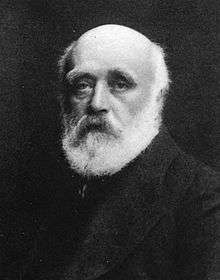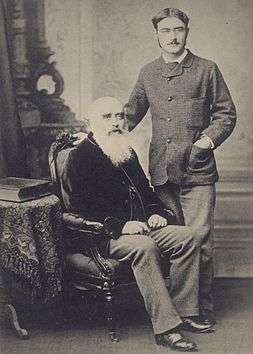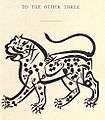John Lockwood Kipling
| John Lockwood Kipling | |
|---|---|
 Portrait of J. Lockwood Kipling, by Hollinger. | |
| Born |
6 July 1837 Pickering, North Yorkshire, England |
| Died |
26 January 1911 (aged 73) Tisbury, Wiltshire, England |
| Occupation | Art teacher, illustrator, museum curator |

John Lockwood Kipling, C.I.E.[1] (6 July 1837 – 26 January 1911), was an English art teacher, illustrator, and museum curator who spent most of his career in British India. He was the father of the author Rudyard Kipling.
Life and career
Lockwood Kipling was born in Pickering, North Yorkshire, the son of Frances (Lockwood) and Reverend Joseph Kipling,[2] and was educated at Woodhouse Grove School, a Methodist boarding school. He met his wife Alice MacDonald while working in Burslem, Staffordshire, where his designs can still be seen on the façade of the Wedgwood Institute.[3]
Alice was the daughter of a Methodist minister, the Reverend George Browne Macdonald. Kipling married in 1865 and moved with his wife to India, where he had been appointed as a professor of architectural sculpture in the Jeejeebhoy School of Art in Bombay (now Mumbai), and later became its principal.[3]
Their son was born soon after, in December 1865, and was christened Rudyard after Rudyard, Staffordshire, the place where his parents had first met;[3] their daughter Alice Kipling was born in 1868. In 1870-1872 Kipling was commissioned by the government to tour the Punjab, North-West Frontier and Kashmir and make a series of sketches of Indian craftsmen as well as various sights and antiquities in these regions. Today several of these sketches are at the Victoria and Albert Museum whilst others were printed in a number of books.[3]
In 1875, Kipling was appointed the Principal of Mayo School of Arts, Lahore, British India (present day National College of Arts, Pakistan) and also became curator of the old original Lahore Museum which figured as the Wonder House or Ajaib Ghar in Kim,[4] not to be confused with the present one.[5] He retired back to England in 1893.
Kipling illustrated many of Rudyard Kipling's books, and other works, including Tales of the Punjab by Flora Annie Steel. He also worked on the decorations for the Victoria and Albert Museum in London and friezes on the Crawford Market in Bombay. The friezes of the Crawford Mark are done in a Romano-gothic style. The west entrance displays trader and sack-scales with porter, planter and water carrier around a well-head, while the east features several bullock carts.[6] John Kipling designed the uniforms and decorations for the Imperial Assemblage at Delhi in 1877, organized by the Viceroy of India, Lord Lytton, at which Queen Victoria was proclaimed Empress of India.
During his tenure as the Principal of the Mayo School of Art, Lahore, he patronised indigenous artisans and through training and apprenticeship transformed them into craftsmen and designers. One of his protégés was Bhai Ram Singh, who assisted him in his imperial commission for decorating the Durbar Room at Osborne House. Kipling also remained editor of the Journal of Indian Art and Industry, which carried drawings made by the students of the Mayo School.
He died in 1911, and is buried in the parish of Tisbury, Wiltshire.[7]
Main published works
- Beast and Man in India: A Popular Sketch of Indian Animals in Their Relations with the People, Published by Macmillan and Co, London, 1891.
- Inezilla: A Romance in Two Chapters, by J.L.K. Reprinted from The Chameleon, Allahabad, [1873].
- Across the Border: Or, Pathân and Biloch, by Edward Emmerson Oliver, Illustrations by John Lockwood Kipling. Published by Chapman and Hall, 1890.
- Tales of the Punjab Told by the People, by Flora Annie Webster Steel, Richard Carnac Temple, John Lockwood Kipling. Published by Macmillan and co., 1894.
- The Two Jungle Books, by Rudyard Kipling. Illustrations by J. Lockwood Kipling, C.I.E., and W. H. Drake. Published by Doubleday, Doran & Company, Inc., New York, 1893.
 Illustration for a chapter capital in the 1895 edition of The Two Jungle Books (1895), a compilation of The Jungle Book and The Second Jungle Book, both by his son, Rudyard Kipling.
Illustration for a chapter capital in the 1895 edition of The Two Jungle Books (1895), a compilation of The Jungle Book and The Second Jungle Book, both by his son, Rudyard Kipling. Bas-relief from a series illustrating Kim.
Bas-relief from a series illustrating Kim.- Mayo College, Ajmer, India Coat of Arms designed by (John) Lockwood Kipling.
 Cryptic dedication page with Arabic inscriptions.
Cryptic dedication page with Arabic inscriptions. Wood Carver at Shimla, pencil and ink drawing by J. Lockwood Kipling, 1870.
Wood Carver at Shimla, pencil and ink drawing by J. Lockwood Kipling, 1870.
References
- ↑ John Lockwood Kipling, C.I.E. New York Times, 24 January 1892.
- ↑ John Lockwood Kipling thepeerage.com.
- 1 2 3 4 Drawing by John Lockwood Kipling, and Biography Victoria & Albert Museum.
- ↑ Tarin, O, in 'The Kipling Journal', June 2008, pp 10-21
- ↑ For details see Peter Hopkirk, Quest for Kim:In Search of Kipling's Great Game London: J Murray, 1996
- ↑ Steggles, Mary Ann; Barnes, Richard (2011). British Sculpture in India: New Views and Old Memories. Norfolk: Frontier. p. 235. ISBN 978-1-872914-41-1.
- ↑ Papers of John Lockwood Kipling University of Sussex.
Further reading
- The Pater: John Lockwood Kipling His Life and Times 1837-1911, by Arthur R Ankers, ISBN 1-871044-00-6
- The Kipling Papers: A List of Papers of John Lockwood Kipling 1837-1911, Joseph Rudyard Kipling 1865-1936, and of Some Papers of Josephine, Elsie and John Kipling from Wimpole Hall, Cambridge. by University of Sussex Library. Manuscripts Section, Rudyard Kipling. Published by University of Sussex Library, 1980. ISBN 0-85087-014-3.
- Official Chronicle of the Mayo School of Art: The formative years under Lockwood Kipling. (1875 to 1893), Researched and Introduced by Nadeem Omar Tarar. Samina Choonara (editor). National College of Arts, Lahore, 2003, ISBN 969-8623-00-0
External links
- Kipling Archive University of Sussex.
- Works by John Lockwood Kipling at Project Gutenberg
- Works by or about John Lockwood Kipling at Internet Archive
- Works held by the Victoria and Albert Museum
| Wikimedia Commons has media related to John Lockwood Kipling. |